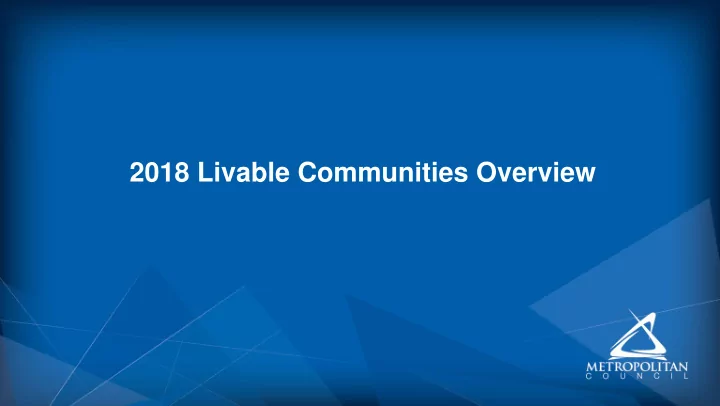

2018 Livable Communities Overview
Metropolitan Council Livable Communities Act (473.25) Voluntary, incentive-based approach for communities to: • Expand affordable housing choices (LHIA) • Clean-up polluted lands for jobs and tax base (TBRA) • Achieve interrelated development patterns that link housing, jobs and services; mix incomes of residents in housing; and encourages infrastructure investments that connect neighborhoods, attract private investment, and provide expanded employment opportunities (LCDA) • promote moderate to high density development projects located within walking distance of a major transit stop that typically include a mix of uses such as housing, jobs, restaurants, shops, and entertainment (LCDA TOD category) 2
Participating Communities 1996-2009 • 105 Communities in 2009 • In 2010, 11 Cities chose not to renegotiate 2020 housing goals: • Columbus • Minnetonka • Spring Lake Beach • Shakopee Park • Circle Pines • Afton • Empire • Bayport • Landfall Township • Sunfish Lake • Little Canada 3
Participating Communities 95 Participating Communities in 2018 • East Bethel joined in 2010 4
LCA Statutory Guidelines-all accounts • MN Statutes 473.25 • Consistent with Metro Development Guide ( Thrive MSP 2040 ) • Create & preserve living wage jobs • Create incentives for a full range of housing opportunities • Create opportunities for affordable housing • Create incentives for compact & efficient development 5
LHIA Statutory Guidelines • MN Statutes 473.254 • Expand housing choices • Increase affordable owner and rental housing • Preserve existing affordable housing 6
TBRA Statutory Guidelines • MN Statutes 473.252 • Clean up polluted land in the metro area • Provide the highest return in public benefits for the public costs incurred • Preserve or create living-wage jobs and/or affordable housing • Enhance the municipality’s tax base 7
LCDA Statutory Guidelines • MN Statutes 473.253 • Connect development with transit • Connect housing and employment • Achieve compact development • Mix housing types • Provide infrastructure to connect communities and attract investment 8
2017 LCA Funding Amounts Amoun Fund Comment t $5 M 2 rounds, including $250,000 for site TBRA regular program investigation $1 M 2 rounds TBRA SEED program LCDA regular program $7.5 M 1 round LHIA $2.5 M 1 round, with MN Housing RFP • 1 round for LCDA-TOD development • 2 rounds including $500,000 for LCDA- LCDA-TOD $5 M TOD pre-development $2 M • 1 round, both cleanup & investigation TBRA-TOD Total $23 M
Typical LCA Calendar Spring Summer Fall Winter TBRA Apps due Awards Apps due Awards Round #1 Round #1 Round #2 Round #2 TOD Pre-Dev Apps due Awards Apps due Awards Round #1 Round #1 Round #2 Round #2 LHIA Apps due Award LCDA Project Apps due Award Concept Plans due TOD (both Project Apps due Award Concept Plans LCDA and TBRA) due Design Team Review
What we’ve done so far Since 1996, the Council has awarded: • $343 million, through 1,000 grants, to 83 communities • $117.5 million for polluted site clean-up • $35.3 million for affordable housing, through LHIA • $142.7 million for affordable housing, community development and redevelopment, through LCDA • $47.6 million for Transit-Oriented Development 11
LCA Awards 1996-2016 12
LCDA Grant Highlights Commons @ Penn, Minneapolis Artspace Hastings River Lofts, Hastings 13
LHIA Grant Highlights Clare Terrace, 66 West, Edina Robbinsdale 14
TBRA Grant Awards Surly Brewing, Gallery Flats, Hopkins Minneapolis 15
TOD Grant Highlights Vandalia Tower, Saint Paul Mill City Quarter, Minneapolis 16
Community Feedback • “This project, particularly the gateway between Excelsior [Boulevard] and Main Street, couldn’t have happened without an LCDA grant” - Meg Beekman, City of Hopkins, The ARTery • “It’s not a huge project but the impact has been huge. One smaller infill project in the right location can make a huge difference” -Kari Gill, Cambrian Commons, Dakota County CDA • “The Met Council was extremely helpful and supportive during the development process, there were no hurdles” -Cary Teague, 66 West, City of Edina 17
Developer Feedback • “My job is to fill a gap - but it’s not like developing in the North Loop. I need partnerships like LCDA to fill this gap” -Devean George, Commons @ Penn • “Without LCDA funding, many project elements would have been implemented on a much smaller scale if not at all” -Becky Carlson St. Clair, Artspace Hastings River Lofts • “Our projects do not happen without LCA. We realize we won’t get every grant we apply for, but we respect the process and are big believers in what [LCA does]. LCA funding doesn’t just make a big difference in our communities, but a big difference for everyone in the region. Whether it’s been New Hope, Edina, or Minneapolis, communities don’t get the benefit without supporting this program.” -Scott Tankenoff, Hillcrest Development 18
Recommend
More recommend